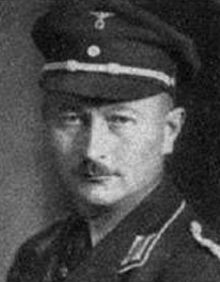Ernst Schmitt (politician)
Friedrich Ernst Schmitt (born April 5, 1896 in Staudernheim ; † October 17, 1972 there ) was a German politician ( NSDAP ).
Live and act
The son of a blacksmith attended elementary school and completed an apprenticeship as a blacksmith and locksmith . From 1914 to 1918 he took part in the First World War. During the war he was wounded several times and was awarded the Iron Cross, 2nd class. He then worked briefly from November 1918 to March 1919 for the railroad, then studied for two and a half years at the Bingen technical center , which he left with an engineering exam. Until 1933 he worked as a foundry engineer in various foundries. Schmitt had been married since 1920; the marriage had three children.
In 1923 Schmitt joined the NSDAP for the first time ( membership number 5,864). During the Allied occupation of the Rhineland in 1923 he was temporarily expelled by the French occupation authorities. After the re-admission of the NSDAP, which had been banned after the Hitler putsch , he rejoined the party in May 1925 (membership no. 8.560). After a dispute over social issues with the Gauleiter of Hannover-Ost, Bernhard Rust , he resigned from the NSDAP in November 1926, but rejoined the party in April 1928 after a discussion with Gauleiter Robert Ley . In the party, Schmitt was the district leader for the Meisenheim district and - after the affiliation of the district - for Kreuznach . He also headed the local NSDAP group in Bad Kreuznach . In 1929 Schmitt became a member of the Meisenheim district council and chairman of the NSDAP parliamentary group. From 1932 to autumn 1933 he was a member of the Prussian Landtag and the Provincial Parliament of the Rhine Province .
After the transfer of power to the National Socialists, Schmitt was the NSDAP's representative for the Baumholder office and the Kreuznach, Birkenfeld and Zell districts . In June 1933 he imposed “ protective custody ” on Social Democrats . From November 1933 until the end of the Nazi regime in the spring of 1945, Schmitt was a member of the National Socialist Reichstag for constituency 21 (Koblenz-Trier) . From 1933, he held his office as Kreuznach district leader on a full-time basis. In addition, he served as the first district deputy of the Kreuznach district and in 1933 took over the business of the district administrator for a few months . In the party, Schmitt was district inspector in the Koblenz-Trier district from 1933 to 1936. It should have come to differences with Gauleiter Gustav Simon , as a result of which there were several party court cases against Schmitt.
Schmitt headed the November 1938 pogroms in the Kreuznach district and was personally involved in the destruction of Jewish homes in Bad Kreuznach. After the German occupation of Luxembourg , he served as land commissioner in the district of Luxembourg in August and September 1940 .
In the final phase of the Second World War , Schmitt fled Bad Kreuznach. On May 8, 1945, he was captured by American troops and interned in Ludwigsburg under automatic arrest . In June 1947 Schmitt was relocated to Fallingbostel in the British occupation zone at his own request , which he hoped would be released more quickly. In the denazification Schmitt was established in June 1948 by a Lower Saxony Spruchkammer sentenced to 18 months in prison and fined. Internment detention was counted towards the sentence. After his release in the same month, he lived first in Plettenberg and from 1949 in Mühlheim am Main , as he feared that the French occupation authorities there would arrest him again on his return to Staudernheim.
In December 1951, the Bad Kreuznach regional court sentenced Schmitt to two and a half years in prison for crimes against humanity . The judgment was overturned by the Federal Court of Justice and, in a new hearing in April 1954, reduced to one and a half years, to which the internment detention was fully counted. According to the indictment of February 1951, Schmitt was "the absolute ruler in the Kreuznach district, whose orders and orders no one dared to oppose in view of his own imperious nature". In a second denazification process in March 1951, Schmitt was classified by a ruling chamber in Koblenz as an “incriminated person”.
literature
- Joachim Lilla , Martin Döring, Andreas Schulz: extras in uniform: the members of the Reichstag 1933–1945. A biographical manual. Including the Volkish and National Socialist members of the Reichstag from May 1924 . Droste, Düsseldorf 2004, ISBN 3-7700-5254-4 , p. 575 .
- Franz Maier: Biographical organization manual of the NSDAP and its divisions in the area of today's state of Rhineland-Palatinate . (= Publications of the Parliament's Commission for the History of the State of Rhineland-Palatinate , Volume 28) Hase & Koehler, Mainz 2007, ISBN 978-3-7758-1407-2 , pp. 418-420.
Web links
- Ernst Schmitt in the database of members of the Reichstag
- Entry on Ernst Schmitt in the Rhineland-Palatinate personal database
Individual evidence
| personal data | |
|---|---|
| SURNAME | Schmitt, Ernst |
| ALTERNATIVE NAMES | Schmitt, Friedrich Ernst (full name) |
| BRIEF DESCRIPTION | German politician (NSDAP), MdR, MdL |
| DATE OF BIRTH | April 5, 1896 |
| PLACE OF BIRTH | Staudernheim |
| DATE OF DEATH | 17th October 1972 |
| Place of death | Staudernheim |

